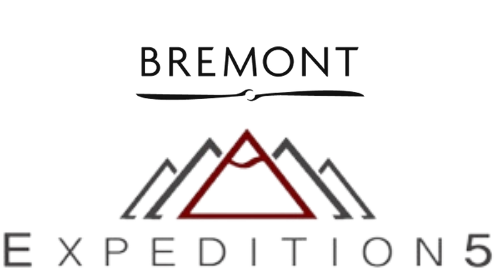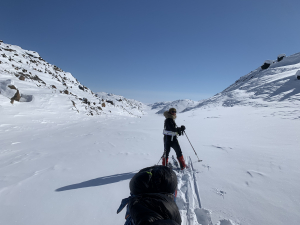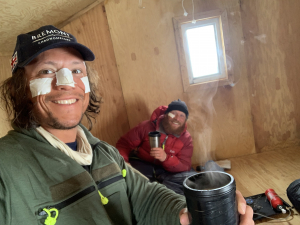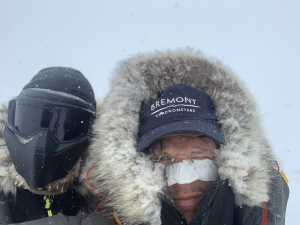Zigg-zagging our way uphill
When I last left you our two hapless heroes fate rested in the balance. Against all odds we had managed to navigate a series of unexplored valleys to reach the start of a route used by generations of Inuit hunters. Before you re-join our tale of misadventure, I’d like to take a trip with you back in time.Back to the very beginning of our adventures.
Back to Borneo.
Thursday 17th November 2016
Tenggarong, East Kalimantan.
The second day of our very first expedition together. We had checked out of our hotel on the east coast of Borneo and had begun to head west with no idea of where we would sleep that night or the unknown number of nights that lay on the 1500km ahead of us.
The enormity of the situation we had signed ourselves up for was magnified tenfold with each step we took through the 40-degree, humid and polluted streets out of the city of Samarinda. Far from home, uncertain of our ability to complete the challenge, coupled with the intense physical strain was threatening, at the very beginning, to completely overwhelm us. Hobbling bent double up what seemed our thousandth insurmountable hill, a car stopped and the lady inside with her husband asked what we were doing. After explaining to her in broken Bahasa, she wrote her address on a piece of paper and asked us to stay with her and her family that evening.
This ladies name was Shinta; she was the first of many people on this journey to have been a beacon of hospitality and kindness during what has, at times been almost unbearable hardship. The simple quote she looked up in English in her Bahasa/English dictionary when we asked for why her family had welcomed us in has always stuck with me since that day:
“We all the same animal”
Now, back to the current tale in hand (there’s a point to this I promise.)
The first snow-clad, frozen waterfall clad ahead at the edge of the lake reiterated the fact that a hunting trail used by skidoos and dog teams is not necessarily the best route for two men dragging pulks. With no other options ahead of us we plotted the flattest route we could using data from our GPS and the landscape surrounding us. The cruel irony of the flattest route was that it still had us climbing the same height in meters (650m) in 3 days as we had anticipated to climb on the Isurtuq on our original routein over 20.
With fresh snow and warmer conditions, we were faced with the same misery as the start of our expedition. Slushy wet powder on steep slopes is not conducive to dragging a pulk or even skiing with no weight. It presented us with what has been one of the hardest physical challenges of our lives. I can honestly say this is possibly the only time on our expeditions where I think the training put in beforehand has made a bigger difference than mental fortitude. On our second day through the trails, Ted (who has been arranging our collection with one of his Inuit friends) messaged us with the coordinates for an Inuk fishing cabin near the coast where we would meet his friend on the 27th for our qamuti ride to Pangnirtung (the nearest settlement to our finish point). Actual hard cover!! After our past few weeks this was the injection of morale and motivation we needed to get up the remaining powder-soaked hills.
Heading down Shinta’s Pass
At our final hill, a steep 400m climb, we were greeted by a mountain pass of sortsthat led in a straight gradual slope towards the frozen lake where the fishing cabin was situated. This pass, for better or worse was to lead us out of the dark days we have faced over the past few weeks and hopefully to succeeding in crossing Baffin Island. I am sure the locals have a name for it as it is it seems a prominent and direct pass between the lake and the coast, however there was only one thing we could name it.
So, we skied our way through Shinta’s Pass (told you there was a point!) and campedat the bottom before heading on to the cabin the following morning. Like itsnamesake it showed us the way during a difficult time. The cabins out here are much like bothys in Scotland. They are used by the Inuit hunters and fishermen when on their long trips. This one was a small wooden shelter with a corrugated tin roof in a desolate frozen mountain pass. We wasted no time in making the cabin home, and after our time spent on this expedition, it felt like a five-star hotel, speaker on full blast blaring Kenny Rodgers whilst we prepared for our dash to the coast.
Hot wets, hard cover and morale
The cabin was located 6km from the coast which meant we could do a quick dash with no pulks to the sea and come back. A lovely easy jaunt, right?
Now come on. What have we learned?
We awoke to howling winds and complete whiteout blizzards. With this the last day before our collection we knew we had to get to the coast or face falling at the very last hurdle. Whiteouts with drifts in mountainous terrain is perhaps some of the most dangerous conditions we have ever faced. The GPS was watched like a hawk as depth perception is completely gone. This is fine in places like an ice cap (away from crevasse fields) in Greenland/Antarctica or on sea ice. It is not however, fine when you are likely to ski off a cliff or into a section of corniced snow. Even without a pulk this short trip to the coast was extremely challenging and dangerous and had us questioning whether 6k was worth it. But like the stubborn morons we both are, we made it, slipping and sliding to the sea ice, where in time honoured fashion we recorded the standard video.
Job done.
Five islands. Five unique and extremely challenging expeditions. A gimmick without a doubt, but our gimmick and what a gimmick it has been. Those not happy with the way these journeys have been completed are welcome to wade a mile through a melting Arctic river in our skis. We have, since our challenges inception, done our utmost to do it justice whilst keeping it achievable and hold down jobs in the process, not an easy undertaking. No one in history has even attempted a feat such as this, perhaps they never thought to, or maybe no one has ever been this stupid. Regardless of why we are the first people ever to even attempt such a wide range of extremely challenging expeditions with this end goal. Anyone not happy with our definition of a traverse, what colour skis we used or how we went about it is welcome to get intouch with me and I will politely (I won’t be polite) tell you to get life.
From constructing a raft in the Muller-Schwaner mountain range to escape starving in the jungle, to witnessing the dance of the dead in Madagascar this journey has taken us to places we never dreamed possible, do things we never thought achievable and meet people who have changed the way we view the world for the better. I sit writing this blog in an Inuit hunting cabin 180km from the nearest settlement surrounded by mountains and snow. Adventure doesn’t come any more real than this.
When we started these journeys, we were two lost young men trying to find ourselves and a purpose outside of the tribe of the Royal Marines. Purpose, we found in buckets and with that we have gained a newfound understanding of what we truly want from life.
Right. Now comes the off on a massive tangent, cliche and corny bit. Brace yourselves.
If you’re still reading at this point, I’m pretty sure you’ve signed up for the full package so let’s get down to it.
There is and always has been another member of Expedition 5 (aside of course from Steve Arnold the legend that runs our mission control) on our expeditions. He first appeared (I’m assuming it’s a him) in Borneo, and has been lurking about ever since. Though it wasn’t until the morning Louis, and I fell through the ice that I got thoroughly reacquainted with him again. In my head I know him as the dread. Usually he stays in the shadows, occasionally coughing to let you know he is still there, in the shadows he is the cold uncertain feeling you get occasionally that things aren’t going right. When you get fully introduced to him however, he is the all-consuming blackness that overwhelms your every thought with the fear that you may never see your friends and loved ones ever again.
In Borneo I spent a great deal of time with him lost in the jungle. Then the morning after the evening we spent wading/swimming through a melting canyon river at -27 degrees, as we sat in our tent struggling to warm up. He silently entered, sat down and began to wrap his shadowy tendrils around us. It is a feeling almost like cold water slowly dripping on you until you are soaking wet. The thought that there is a very strong possibility that despite your best endeavours that you might not make it out of this situation alive. From experience he always arrives during the silent hours after the event where you are more preoccupied with dealing with your survival, at a time when you have stopped and have moment to mentally appraise the situation you are in, before leaving shortly after.
They say fortune favours the brave (wait am I repeating myself here…? It has been a long month). She may well do. However, what is your idea of fortune?
When the dread leaves, he always leaves a gift.
Sharper than a razor and clearer than the bluest ice but as easily lost as snow in a stream if you don’t grab it straight away. The gift he leaves is the realisation of what is important to you. True hardship will give you perspective in life, but never a light will shine so bright as when the dread has come a calling.
So, perhaps, through our misfortune we have discovered our real fortune.
And it is as cliche as it possibly could be. Nights spent close to a partner watching films, eating fish and chips with a favourite
relative, pretending not to be bored as you hear the same story told a thousandth time by your friend in the beer garden, walking the dog, dancing. All the things we do with people we know and care about that seem meaningless at the time, but hold more meaning than we could ever hope to understand.
Love.
It isn’t freezing to death in a tent in the Arctic or drowning on a raft in Borneo no matter how cool it sounds.
I said it was going to get corny.
It’s taken us a long time to find ourselves out in the wild. Without these journeys we would still be struggling to accept normality and find our place in the world. Like many veterans, in fact like many young men everywhere we wanted something to define us and give us a sense of purpose. This adventure has certainly done that but in doing so it has helped us discover who we really are and what is truly important in
life.
What’s next? Who knows? but going forward we can both be happy in the knowledge that what we have achieved here is something to be extremely proud of. Chasing the adventure dragon purely for the thrill of the ride isn’t something we will need to do again anytime shortly (ask us again if we still feel this way after a few weeks work, traffic jams and busy supermarkets).
So, this is us signing off for now, we will continue to trickle out photos and content as we have been throughout these journeys. There may be more to come on the media side of things but that again presents a much bigger minefield of disappointment and arseholes then any expedition ever could. Who knows though, the Mad Explorers could be coming to a tv near you sometime soon/not so soon/never at all. With hundreds of hours of broadcast quality footage covering a truly unique set of journeys and a production deal it may well happen. Our story that we have documented from the very beginning is real, raw and (in our opinion) better than 99% of the rubbish you see on TV. But that world, the same world where Mrs Browns Boys and The Kardashians reign supreme, sure as hell isn’t a meritocracy so we won’t hold our collective breath just yet.
For everyone that has followed our journey, whether from day one in Borneo or for our final chapter across Baffin, we truly appreciate being able to share our journey and the support you have all shown us.
Like we have reiterated many times through these expeditions we could never have got close to finishing if it wasn’t for the overwhelming belief shown in us from sponsors to well-wishers.
Trying to take a selfie in very challenging conditions…
And for the final time for now…you know the drill. If following this journey has benefitted, inspired, or amused you in any way we would be grateful if you “Chuck us a fiver” to our chosen charity The Royal Marines Charity via the button below.
Peace out sisters and brothers.
Anthony Lambert
Co-founder Expedition5
anthony.lambert@expeditionfive.co.uk
www.expeditionfive.co.uk




